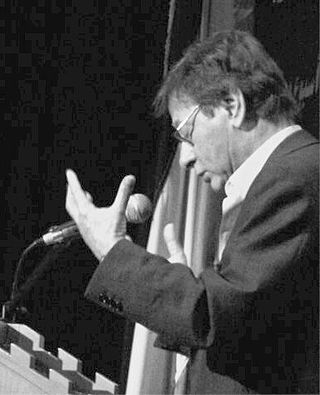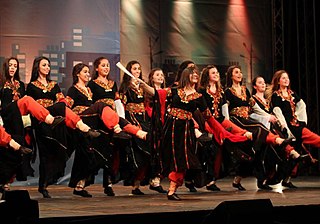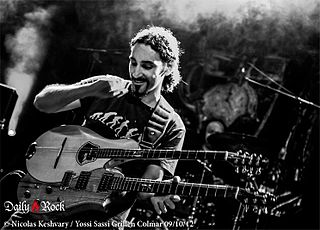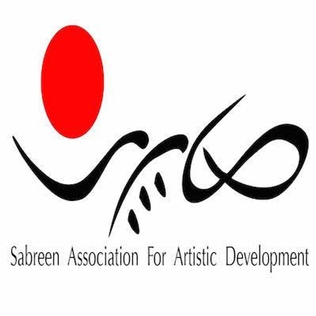
Kamilya Jubran is a Palestinian singer, songwriter, and musician.

Kamilya Jubran is a Palestinian singer, songwriter, and musician.
Kamilya Jubran was born in Acre (Akka) in 1962 to Palestinian parents. [1] [2] Her father Elias is a music teacher and maker of traditional Palestinian instruments such as the oud. [3] Her brother Khaled is also a musician. [4] Jubran and her family were featured in Telling Strings (2007), a documentary about generational differences and cultural identity in Palestine. [5]
She moved to Jerusalem in 1981 to study social work at the Paul Baerwald School of Social Work and Social Welfare at the Hebrew University of Jerusalem. [2] It was there that Jubran discovered her identity, history and heritage. After being introduced to Said Murad, the founder of musical group Sabreen (patient ones), Jubran joined the group in 1982 (2 years after its foundation) and became the only Palestinian member who had been born in Israel. In 2002, she moved to Europe. [6]
Jubran plays the oud and qanun, among other instruments. [1] From 1982-2002, she was the lead singer of Sabreen, an Arabic musical group based in occupied East Jerusalem. Since 2002, she has toured solo and collaborated with a range of European musicians, including Werner Hasler. [1]
In 2013, she was featured alongside Tom Morello and Julian Assange as a guest artist on Calle 13's single "Multi_Viral".
Sabreen
Solo

The oud is a Middle Eastern short-neck lute-type, pear-shaped, fretless stringed instrument, usually with 11 strings grouped in six courses, but some models have five or seven courses, with 10 or 13 strings respectively.

The rich and varied music of Sudan has traditional, rural, northeastern African roots and also shows Arabic, Western or other African influences, especially on the popular urban music from the early 20th century onwards. Since the establishment of big cities like Khartoum as melting pots for people of diverse backgrounds, their cultural heritage and tastes have shaped numerous forms of modern popular music. In the globalized world of today, the creation and consumption of music through satellite TV or on the Internet is a driving force for cultural change in Sudan, popular with local audiences as well as with Sudanese living abroad.
Arabic music is the music of the Arab world with all its diverse music styles and genres. Arabic countries have many rich and varied styles of music and also many linguistic dialects, with each country and region having their own traditional music.
The music of Israel is a combination of Jewish and non-Jewish music traditions that have come together over the course of a century to create a distinctive musical culture. For almost 150 years, musicians have sought original stylistic elements that would define the emerging national spirit. In addition to creating an Israeli style and sound, Israel's musicians have made significant contributions to classical, jazz, pop rock and other international music genres. Since the 1970s, there has been a flowering of musical diversity, with Israeli rock, folk and jazz musicians creating and performing extensively, both locally and abroad. Many of the world's top classical musicians are Israelis or Israeli expatriates. The works of Israeli classical composers have been performed by leading orchestras worldwide.

The music of Palestine is one of many regional subgenres of Arabic music. While it shares much in common with Arabic music, both structurally and instrumentally, there are musical forms and subject matter that are distinctively Palestinian.

David Simon Berwick Broza is an Israeli singer-songwriter. His music mixes modern pop with Spanish music.

Amal Murkus is a Palestinian singer. Her post-modern music style has a variety of Mediterranean influences. Her first album, Amal, was released in 1998, and her second, Shauq, in 2004. Her songs take inspiration by Palestinian folklore, traditional Arabic heritage, and pop music elements, and express the struggle against the marginalization and exclusion that Arab Palestinian culture feels.

Mahmoud Darwish was a Palestinian poet and author who was regarded as Palestine's national poet.

Gilad Atzmon is an Israeli-born British jazz saxophonist, novelist, political activist, and writer.
The various nations of the region include the Arabic-speaking countries of the Middle East, the Iranian traditions of Persia, the Jewish music of Israel and the diaspora, Armenian music. Azeri Music, the varied traditions of Cypriot music, the Turkish music of Turkey, traditional Assyrian music, Coptic ritual music in Egypt as well as other genres of Egyptian music in general. It is widely regarded that some Middle-Eastern musical styles have influenced Central Asia, as well as the Balkans and Spain.

Simon Shaheen is a Palestinian-American oud and violin player and composer.

Dabke is a Levantine folk dance, particularly popular among Lebanese, Jordanian, Palestinian and Syrian communities. Dabke combines circle dance and line dancing and is widely performed at weddings and other joyous occasions. The line forms from right to left and the leader of the dabke heads the line, alternating between facing the audience and the other dancers.

Yair Dalal is an Israeli musician of Iraqi-Jewish descent.

Ara Dinkjian is an Armenian-American musician. He is the founder of the band Night Ark. Dinkjian is considered one of the top oud players in the world, his compositions have been recorded in thirteen different languages, which include the multi-platinum hit "Dinata" which was performed in the closing ceremonies of the 2004 Olympic Games in Athens.
Salman Masalha is an Israeli poet, writer, essayist and translator. Masalha is a bilingual writer who writes in Arabic and Hebrew, and publishes in both languages. His poetry has also appeared in other languages. Masalha is a frequent contributor to left-leaning Israeli newspaper Haaretz.

Yossi Sassi is an Israeli guitarist and producer who merges traditional and contemporary music. He is the inventor of the "bouzoukitara" musical instrument. He is known for pioneering oriental rock, as well as being the main composer, arranger, and co-founder of Orphaned Land, an Israeli progressive metal band formed in 1991. He also formed the Yossi Sassi Band/The Oriental Rock Orchestra. His debut solo album, Melting Clocks, got him voted "Top Newcomer of 2012" by Rock Hard magazine readers. His 2016 album Roots and Roads was submitted for Grammy Award consideration.

Dina El Wedidi, is an Egyptian singer, composer, guitarist, music producer, and storyteller. Dina has been known as the lead performer of an ensemble of musicians who have performed extensively in the past 2 years, fusing local and global styles of music.

Ramzi Aburedwan is a Palestinian composer, arranger, educator; and viola and buzuq player. He is the founder of Ensemble Dal’Ouna and the Palestine National Ensemble of Arabic Music. He founded the al Kamandjâti music centre and has collaborated with international and renowned musicians. He first studied at the Edward Said National Conservatory of Music and then in the Regional Conservatory of Angers (France). Documentaries have been made of his life, including Its Not a Gun (2005) and Just Play (2012). He is the main subject of the book Children of the Stone: The Power of Music in a Hard Land by Sandy Tolan (2015).

Bashar Murad is a Palestinian singer-songwriter and video artist based in East Jerusalem. His music addresses societal norms, the Israeli occupation, and gender equality in the Middle East. He is best known for his collaboration with Icelandic techno-punk band Hatari on the song "Klefi / Samed", which was released shortly after Hatari raised banners featuring the Palestinian flag at the final of Eurovision Song Contest 2019 in Tel Aviv. Murad released his debut EP Maskhara in June 2021.

Sabreen is a pioneer Palestinian musical group. Based in East Jerusalem, Sabreen was founded in 1980 by Said Murad. Their vision focused on the development of the Palestinian modern song, reflecting the humanitarian and cultural reality in general, and the suffering endured from the political situation in particular. Sabreen's members have changed over the years, the most notable members were Said Murad, Kamilya Jubran, Odeh Tourjman, Issa Freij, Yacoub Abu Arafeh, Issam Murad, Samer Mussallem, and Wissam Murad. Said Murad is the composer and arranger of the music, and Kamilya Jubran was the lead vocalist on four albums out of the five studio albums released.